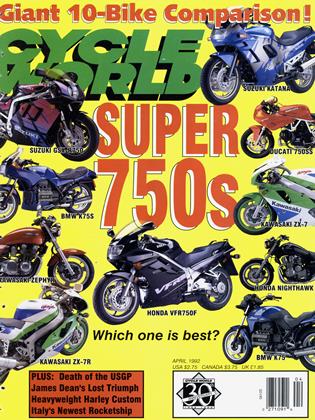FAILED COUP
When Kins Kenny turned outlaw
The FIM has faced a takeover bid before, but the outcome was much different.
When, during the winter of 197980, Kenny Roberts and British journalist Barry Coleman, along with many other top riders including Barry Sheene, Franco Uncini, Kork Ballington and Greg Hansford, actually attempted to steal the world championship series right out from under the FIM’s autocratic nose, the “pirates” were simply overpowered. The FIM had the major circuit owners and promoters behind them solidly, and for a very simple reason: Why pay market price for the services of grand prix riders if
you could have them for peanuts and by royal decree under the “Old Boys” system? The FIM treated the riders like circus animals, paid them absurdly low prize monies, and allowed the organizers (who were usually closely associated with the national federation in question) to make as much profit as their promotional abilities would allow.
Back in those days, the sponsors were disorganized and uncertain of their true power, and the Japanese factories were firmly loyal to the FIM. But what really killed the World Series was the power the FIM held over the circuit owners, who were told that if they allowed an outlaw race to be run on their premises, they would lose all FIM-sanctioned events, national and international. And so, the Roberts rebellion was crushed.
At least Roberts, who had just won his second-consecutive 500cc world title, fared better than another 500cc champion who dared rile the FIM, the
legendary Geoff Duke. At the 1955 Dutch TT, 13 privateers pulled out of the 500cc race at the end of the first lap, protesting low prize money. Duke, winner of the 500cc title from 1953-55, won the race, but publicly supported the riders’ strike. For this, he was suspended for six months-a sentence that cost him his Gilera factory ride and virtually ended his great racing career.
The fact that Roberts raced (and won the title again) in 1980, in spite of being on the losing side in a confrontation with the FIM, is evidence of the fact that the organizers needed his name on the card to fill the house. Also, the FIM would have been hardpressed in 1980 to legally enforce the kind of ban that it had slapped on Duke 25 years earlier. Dennis Noyes
 View Full Issue
View Full Issue
More From This Issue
-
 Up Front
Up FrontUncle George's Last Ride
April 1992 By David Edwards -
 Leanings
LeaningsThe Enchanted Vagabond
April 1992 By Peter Egan -
 TDC
TDCRocket Fuel
April 1992 By Kevin Cameron -
 Letters
LettersLetters
April 1992 -
 Roundup
RoundupNow On Sale: $75,000 Gp Racebike
April 1992 By Brian Catterson -
 Roundup
RoundupKtm Comes Back From the Brink
April 1992 By Alan Cathcart





